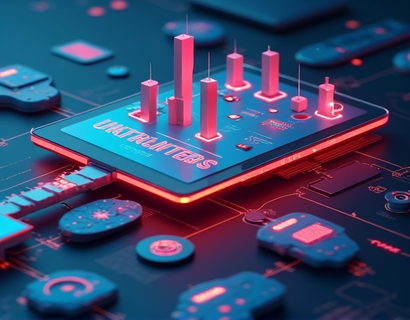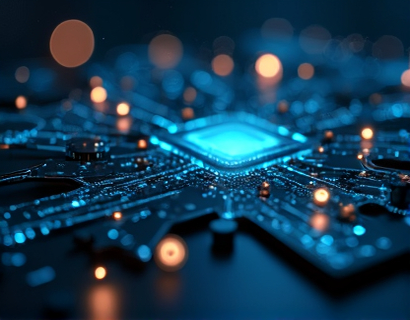AI and Crypto: Pioneering a New Era in Digital Interactions
The intersection of artificial intelligence (AI) and cryptocurrency is giving rise to a revolutionary landscape that is transforming digital interactions and financial empowerment. This synergy is not just a technological curiosity but a practical solution that enhances user engagement and opens new avenues for technological advancement. As we delve into this domain, it's essential to understand how these two cutting-edge technologies are merging to create innovative applications that redefine the digital experience.
Understanding the Basics: AI and Cryptocurrency
To grasp the transformative power of AI and cryptocurrency, it's crucial to first understand each technology individually. Artificial intelligence, a branch of computer science, focuses on creating systems that can perform tasks requiring human intelligence, such as learning, reasoning, and self-correction. AI encompasses various subfields, including machine learning, natural language processing, and computer vision, each contributing to the development of intelligent systems.
Cryptocurrency, on the other hand, is a digital or virtual currency that uses cryptography for security and operates on a decentralized network, typically a blockchain. Bitcoin, launched in 2009, was the first and most well-known cryptocurrency, but since then, thousands of alternative coins (altcoins) and tokens have emerged, each with unique features and use cases. The decentralized nature of cryptocurrencies ensures transparency, security, and reduced reliance on traditional financial institutions.
When these two technologies converge, the potential for innovation is immense. AI can enhance the functionality, security, and user experience of cryptocurrency applications, while cryptocurrency can provide a secure and decentralized platform for AI services. This synergy is giving birth to a new paradigm in digital interactions, one that is more secure, efficient, and user-centric.
Enhancing Security with AI
One of the most significant benefits of integrating AI into cryptocurrency is the enhancement of security measures. Traditional cybersecurity methods often struggle to keep pace with evolving threats, but AI brings a dynamic and adaptive approach to security. Machine learning algorithms can analyze vast amounts of data to identify patterns and anomalies, enabling the detection of fraudulent activities in real-time.
For instance, AI-powered systems can monitor blockchain transactions for suspicious behavior, such as unusual transaction volumes or patterns that deviate from the norm. These systems can automatically flag and prevent potential security breaches, ensuring the integrity of the cryptocurrency network. Additionally, AI can improve the security of digital wallets by predicting and mitigating risks associated with user behavior, such as unauthorized access attempts.
The use of AI in cryptography itself is also advancing. Advanced cryptographic techniques, such as homomorphic encryption and zero-knowledge proofs, are being enhanced by AI to provide stronger security guarantees. These techniques allow for computations on encrypted data without revealing the data itself, ensuring that sensitive information remains protected even during processing.
Optimizing User Experience with AI
Beyond security, AI is revolutionizing the user experience in the cryptocurrency space. One of the key areas is user interface (UI) and user experience (UX) design. AI can analyze user interactions and preferences to create personalized and intuitive interfaces. For example, AI-driven chatbots can assist users in navigating complex cryptocurrency platforms, providing real-time support and guidance.
Natural language processing (NLP) enables more natural and efficient communication between users and AI systems. Users can interact with cryptocurrency applications using voice commands or natural language queries, making the experience more accessible and user-friendly. This is particularly beneficial for users who may not be tech-savvy, as it lowers the barrier to entry for engaging with cryptocurrency technologies.
AI can also optimize the trading experience by providing predictive analytics and insights. Machine learning models can analyze market data, historical trends, and real-time news to offer informed trading recommendations. This not only helps users make better investment decisions but also enhances their overall confidence in the market.
Financial Empowerment Through DeFi and AI
Decentralized Finance (DeFi) is a rapidly growing sector within the cryptocurrency ecosystem, aiming to provide financial services without traditional intermediaries. AI plays a crucial role in enhancing the functionality and accessibility of DeFi platforms. For instance, AI can automate complex financial tasks, such as portfolio management and risk assessment, allowing users to manage their assets more efficiently.
Smart contracts, a cornerstone of DeFi, can be enhanced with AI to execute more sophisticated and adaptive agreements. AI can analyze various factors, such as market conditions and user behavior, to dynamically adjust the terms of a smart contract. This flexibility ensures that agreements remain fair and beneficial for all parties involved.
Moreover, AI can help bridge the gap between traditional finance and cryptocurrency by providing cross-chain solutions. These solutions enable seamless interactions between different blockchain networks, allowing users to access a wider range of financial services. AI-driven platforms can facilitate the conversion of assets, execute cross-chain transactions, and provide comprehensive financial insights, all within a unified interface.
Innovative Applications in Various Domains
The combination of AI and cryptocurrency is not limited to security and user experience; it is also driving innovation in various other domains. One such area is supply chain management. AI can track and verify the authenticity of goods using blockchain, ensuring transparency and reducing the risk of fraud. This is particularly valuable in industries where product authenticity is critical, such as pharmaceuticals and luxury goods.
In the realm of gaming, AI and cryptocurrency are creating new economic models. Blockchain-based games can reward players with cryptocurrency tokens, creating a true digital economy. AI can enhance these games by generating dynamic content, personalized experiences, and intelligent non-playable characters (NPCs). This synergy not only makes gaming more engaging but also provides a new revenue stream for developers and players alike.
Healthcare is another sector benefiting from this integration. AI-powered diagnostic tools can analyze medical data stored on blockchain, providing accurate and secure health records. This can lead to better patient outcomes and more efficient healthcare delivery. Additionally, AI can optimize the distribution of medical supplies and pharmaceuticals using blockchain, ensuring that resources reach those in need promptly and transparently.
Challenges and Considerations
While the potential of AI and cryptocurrency is vast, there are several challenges and considerations that must be addressed. One of the primary concerns is regulatory compliance. The decentralized and borderless nature of cryptocurrencies often clashes with traditional regulatory frameworks. AI can help navigate these complexities by providing compliance tools that monitor and adapt to regulatory changes in real-time.
Another challenge is the technical complexity involved in integrating AI with blockchain technologies. Developing robust and scalable solutions requires expertise in both domains, which can be a barrier for many organizations. However, as the ecosystem matures, more user-friendly tools and platforms will emerge, making it easier for developers and businesses to leverage these technologies.
Privacy is also a critical issue. While blockchain offers transparency, it can also expose sensitive information. AI can help mitigate this by implementing advanced privacy-preserving techniques, such as differential privacy and secure multi-party computation. These methods ensure that data remains confidential while still being useful for AI algorithms.
The Future of AI and Crypto: A Synergistic Path
The future of AI and cryptocurrency is bright, with ongoing advancements promising even more innovative applications. As AI continues to evolve, we can expect more sophisticated and intuitive interactions with cryptocurrency platforms. The integration of AI with emerging technologies like quantum computing and the Internet of Things (IoT) will further expand the possibilities.
For tech-savvy individuals, AI enthusiasts, and digital innovators, the convergence of AI and cryptocurrency represents a fertile ground for exploration and innovation. The potential to create more secure, efficient, and user-centric digital experiences is immense. As the ecosystem grows, it will be crucial to stay informed and adapt to the changing landscape, embracing the opportunities that this synergy brings.
In conclusion, the merging of AI and cryptocurrency is not just a technological trend but a transformative force that is redefining digital interactions and financial empowerment. By leveraging the strengths of both technologies, we can build a more secure, efficient, and inclusive digital world. The journey ahead is exciting, and the possibilities are limitless.











































